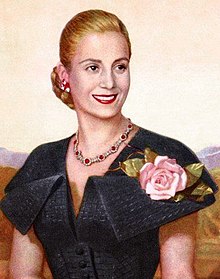Eva Peron
|
Her Excellency Spiritual Leader of the Nation of Argentina Eva Perón |
|
|---|---|

Official Portrait, 1948
|
|
| First Lady of Argentina | |
|
In office 4 June 1946 – 26 July 1952 |
|
| Preceded by | Conrada Victoria Farrell |
| Succeeded by | Mercedes Lonardi |
| President of the Eva Perón Foundation | |
|
In office 8 July 1948 – 26 July 1952 |
|
| Preceded by | Position established |
| Succeeded by | Delia Parodi |
| Personal details | |
| Born |
Eva María Ibarguren 7 May 1919 Los Toldos, Argentina |
| Died | 26 July 1952 (aged 33) Buenos Aires, Argentina |
| Resting place |
La Recoleta Cemetery Buenos Aires, Argentina |
| Nationality | Argentine |
| Political party |
Justicialist Party Peronist Feminist Party |
| Spouse(s) | Juan Perón (1945–1952) |
| Occupation | Actress First Lady Politician |
| Religion | Roman Catholicism |
| Signature | |
María Eva Duarte de Perón (7 May 1919 – 26 July 1952) was the second wife of Argentine President Juan Perón (1895–1974) and served as the First Lady of Argentina from 1946 until her death in 1952. She is usually referred to as Eva Perón (Spanish: [ˈeβa peˈɾon]), or by the affectionate Spanish language diminutive Evita.
She was born in the rural village of Los Toldos, in the Pampas, as the youngest of five children. At 15 in 1934, she moved to the nation's capital of Buenos Aires to pursue a career as a stage, radio, and film actress. She met Colonel Juan Perón there on 22 January 1944 during a charity event at the Luna Park Stadium to benefit the victims of an earthquake in San Juan, Argentina. The two were married the following year. Juan Perón was elected President of Argentina in 1946; during the next 6 years, Eva Perón became powerful within the pro-Peronist trade unions, primarily for speaking on behalf of labor rights. She also ran the Ministries of Labor and Health, founded and ran the charitable Eva Perón Foundation, championed women's suffrage in Argentina, and founded and ran the nation's first large-scale female political party, the Female Peronist Party.
In 1951, Eva Perón announced her candidacy for the Peronist nomination for the office of Vice President of Argentina, receiving great support from the Peronist political base, low-income and working-class Argentines who were referred to as descamisados or "shirtless ones". However, opposition from the nation's military and bourgeoisie, coupled with her declining health, ultimately forced her to withdraw her candidacy. In 1952, shortly before her death from cancer at 33, Eva Perón was given the title of "Spiritual Leader of the Nation" by the Argentine Congress. Eva Perón was given a state funeral upon her death, a prerogative generally reserved for heads of state.
...
Wikipedia
